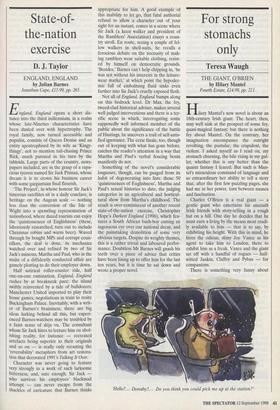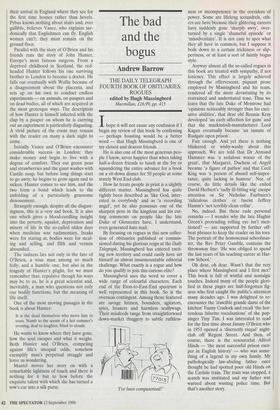For strong stomachs only
Teresa Waugh
THE GIANT, O'BRIEN by Hilary Mantel Fourth Estate, £14.99, pp. 211 Hilary Mantel's new novel is about an 18th-century Irish giant. The heart, then, may well sink at the prospect of some fey, quasi-magical fantasy; but there is nothing fey about Mantel. On the contrary, her imagination encompasses the outright revolting, the pustular, the crapulent, the violent. I asked myself as I read on, my stomach churning, the bile rising in my gul- let, whether this is any better than the quaint fantasy I feared. But such is Man- tel's miraculous command of language and so extraordinary her ability to tell a story that, after the first few puzzling pages, she had me in her power, torn between nausea and fascination.
Charles O'Brien is a real giant — a gentle giant who entertains his uncouth Irish friends with story-telling in a rough hut on a hill. One day he decides that he must earn a living by the means most readi- ly available to him — that is to say, by exhibiting his height. With this in mind, he hires the odious, slimy Joe Vance as his agent to take him to London, there to exhibit him as a freak. Vance and the giant set off with a handful of rogues — half- witted Jankin, Claffey and Pybus — for companions.
There is something very funny about 'Hello?... Dorothy?... Do you think you could pick me up at the station?' their arrival in England where they see for the first time houses rather than hovels. Pybus knows nothing about stairs and, ever gullible, believes Vance, who explains sar- donically that Englishmen can fly. English women can't: they must remain on the ground floor.
Parallel with the story of O'Brien and his friends runs the story of John Hunter, Europe's most famous surgeon. From a deprived childhood in Scotland, the red- headed Hunter follows his one surviving brother to London to become a doctor. He falls out eventually with Wullie because of a disagreement about the placenta, and sets up on his own to conduct endless experiments — on animals, on paupers and on dead bodies, all of which are acquired in the most grotesque ways. The description of how Hunter is himself infected with the clap by a pauper on whom he is carrying out an experiment is particularly disgusting. A vivid picture of the event may remain with the reader on many a dark night to come.
Initially Vance and O'Brien encounter considerable success in London; they make money and begin to live with a degree of comfort. They eat green peas and strawberries and the giant washes with Castile soap, but before long things start to go awry; he begins to grow again and to sicken. Hunter comes to see him, and the two form a bond which leads to the unfolding of a particularly gruesome denouement.
Strangely enough, despite all the disgust- ingness, this is a very sad book. It is also one which gives a blood-curdling insight into the poverty, squalor, deprivation and misery of life in the so-called olden days when medicine was rudimentary, freaks were for staring at, bodies were for steal- ing and selling, and filth and vermin abounded.
The sadness lies not only in the fate of O'Brien, a wise man among so much folly, and a humble one, but also in the tragedy of Hunter's plight, for we must remember that, repulsive though his ways may be to us, he is a great scientist and, inevitably, a man who questions not only our bodily functions, but the meaning of life itself.
One of the most moving passages in the book is about Hunter: It is the dead themselves who move him to tears. Numb to the scents of a hot summer's evening, deaf to laughter, blind to clouds.
He wants to know where they have gone, how the soul escapes and what it weighs. Both Hunter and O'Brien, competing against life's unequal odds, somehow exemplify man's perpetual struggle and leave us wondering.
Mantel moves her story on with a remarkable lightness of touch and there is nothing for it but to bow before the exquisite talent with which she has turned a sow's ear into a silk purse.



































































 Previous page
Previous page